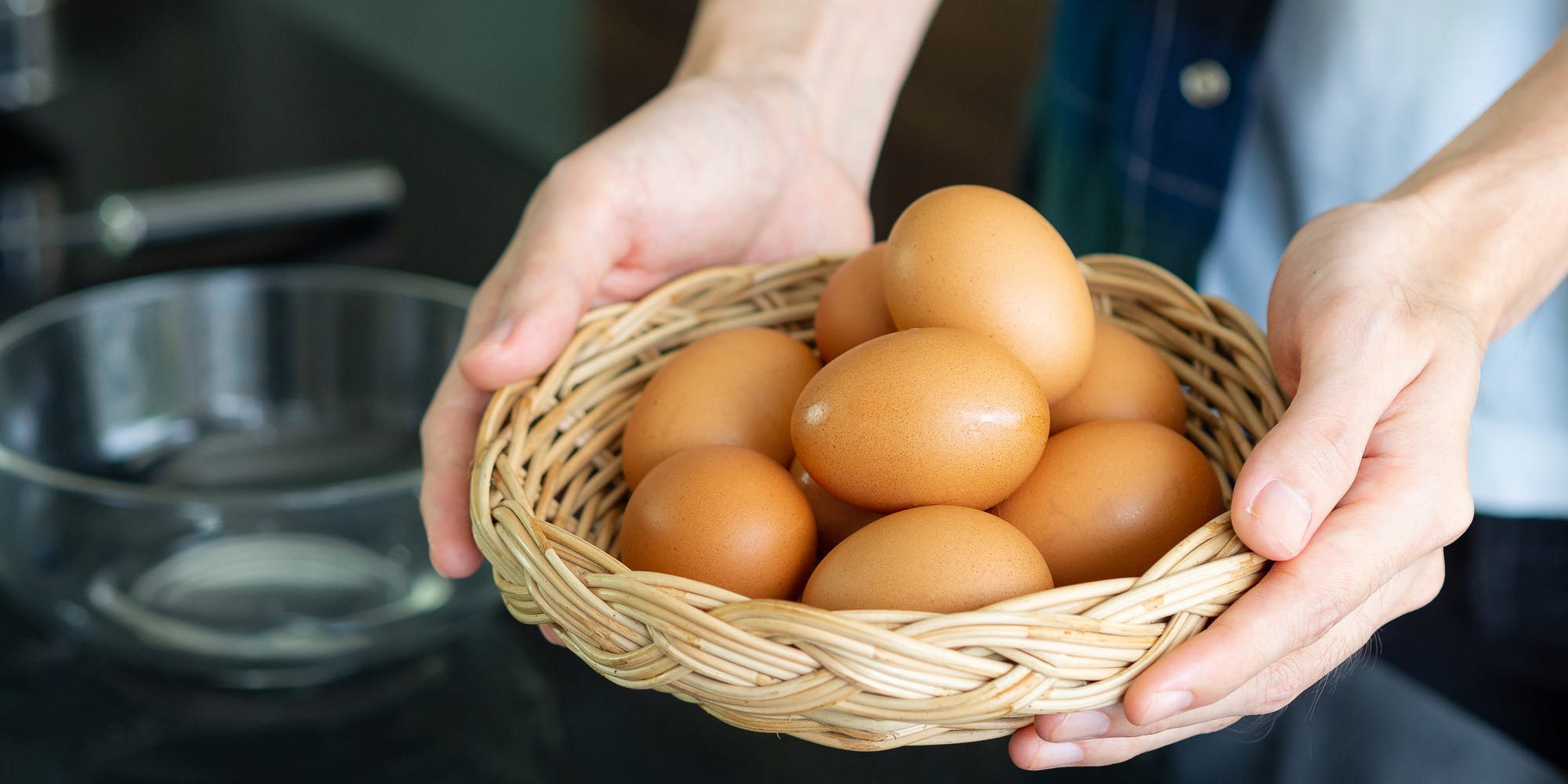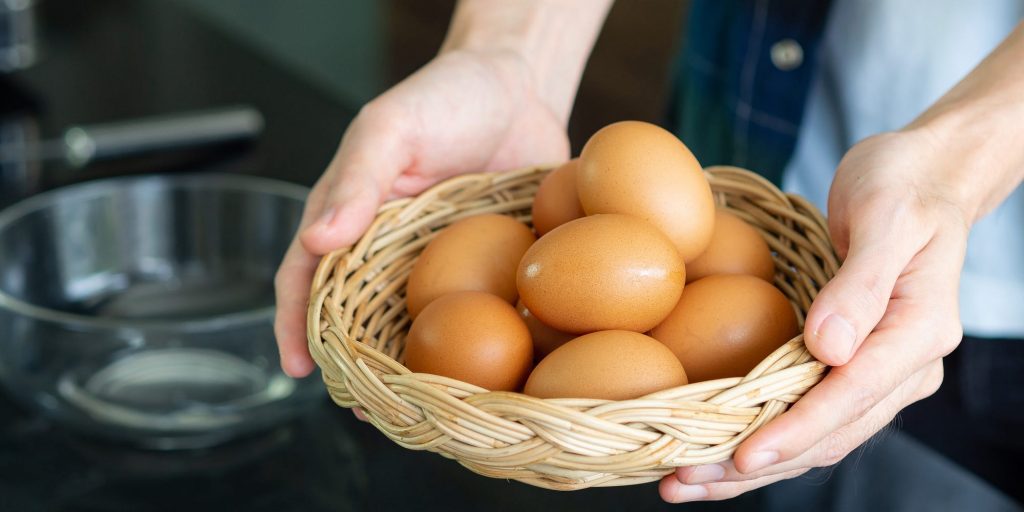
Kanchanalak Chanthaphun / EyeEm / Getty Images
- Anyone with a uterus is usually born with 1-2 million eggs.
- The number of eggs drops dramatically to 100,000-150,000 by your early 30s.
- This rapid decline is largely why fertility declines as you grow older, but it's not the only factor.
- Visit Insider's Health Reference library for more advice.
The female reproductive system is a fascinating network of cells and tissue capable of producing a human being. And the key to it all is the egg.
If you have a uterus, then you were probably born with roughly 1-2 million eggs. But, oddly enough, by the time you hit puberty and are biologically capable of having a child of your own, that number drops dramatically.
Now, it's important to note that the number of eggs you have isn't the only factor when it comes to your chances of getting pregnant. But it is something to consider, especially if you're planning on having children later in life.
How many eggs do you have?
People with uteruses are born with all the eggs they will ever have, meaning there's no way to produce more, says Raegan McDonald-Mosley, MD, MPH, obstetrician-gynecologist and chief executive officer of Power to Decide.
And as you age, you will eventually lose all of those 1-2 million eggs by the time you reach menopause, around age 50. But you won't lose them all the same way.
Here's a look at how many eggs you have during each decade of life up to menopause:
|
Age |
Number of eggs |
Egg loss and fertility |
|
Birth |
About 11,000 eggs die every month before reaching ages 10 to 14, or puberty. |
|
|
Puberty |
After starting the menstrual cycle, about a thousand eggs are lost every month. |
|
|
20s |
150,000 to 300,000 eggs |
The likelihood of getting pregnant generally peaks between the late teen years until late 20s, says McDonald-Mosley. |
|
Early 30s |
100,000 to 150,000 eggs |
Fertility starts to decline during the early 30s, says Klipstein. |
|
Late 30s |
The rate of egg loss increases when you hit age 35. |
|
|
Early 40s |
5,000 to 10,000 eggs |
By age 40, the chance of getting pregnant is less than 5% per menstrual cycle. |
|
Menopause |
About zero to 1,000 eggs |
Very few or practically no eggs remain by the time you reach ages 45 to 55, or menopause. |
How you lose your eggs
Egg loss typically happens one of two ways. The most well-known being ovulation, when your ovaries release a single, mature egg every month or so. If left unfertilized, that egg will leave your body as part of your period.
However, a person will typically only release 300-500 mature eggs in a lifetime. So what happens to 99% of eggs that don't mature?
They break down through a process called follicular atresia, which is part of the body's natural process to remove damaged or unused cells in order to remain healthy.
How egg count affects fertility
Egg loss is a natural part of aging for people with a uterus.
That's why, "age is the most important predictor of fertility," says Sigal Klipstein, MD, FACOG, a fellow with the American College of Obstetricians and Gynecologists and a reproductive endocrinologist at InVia Fertility Specialists.
It's also why after age 45, pregnancies are rare and the majority of them will miscarry, says Klipstein.
Other factors that influence fertility
Although a person initially born with more eggs may remain fertile for a longer period of time, it's important to recognize that egg amount isn't the only factor when it comes to getting pregnant. Egg quality is also key, for example.
Egg quality refers to the likelihood that the egg will grow and implant healthily to the wall of the uterus when it is fertilized. Much like the number of eggs, egg quality also declines naturally with age.
Moreover, don't forget that it takes two to make a baby, and your partner's sperm plays an important role as well. Below is a list of things that can reduce fertility:
- Smoking: Smoking is associated with damage to the eggs and ovaries, which can accelerate the loss of reproductive function. It can also reduce sperm count and motility, or the sperm's ability to swim toward an egg.
- Medical conditions: Medical conditions like endometriosis or polycystic ovary syndrome (PCOS), and sexually transmitted infections (STIs) such as chlamydia or gonorrhea may cause infertility in women, says McDonald-Mosley. Genetic disorders such as cystic fibrosis or Klinefelter's syndrome are associated with infertility in men.
- Cancer treatments: Chemotherapy may reduce the number of healthy eggs and slow down sperm production. Radiation therapy to the abdomen or pelvis can also destroy some or all eggs in the ovaries and damage sperm cells, potentially resulting in infertility.
Some individuals may be under the impression that hormonal contraceptives can cause infertility. However, this is not true, regardless of the method and the duration of use, says McDonald-Mosley.
Insider's takeaway
People with uteruses are born with about 1-2 million eggs, which gradually decreases with age and affects fertility.
Fertility peaks during the late teens until the late 20s, and then it starts to decline as egg quantity and quality drop more drastically from age 30 onwards.
Medical conditions, smoking habits, and cancer treatments may also affect fertility.
"Optimally, people with uteruses should try to conceive when they are at the right time and place in their lives to do so. If they have difficulty, they should reach out to a fertility expert for testing to pinpoint the cause of the infertility," says Klipstein.
